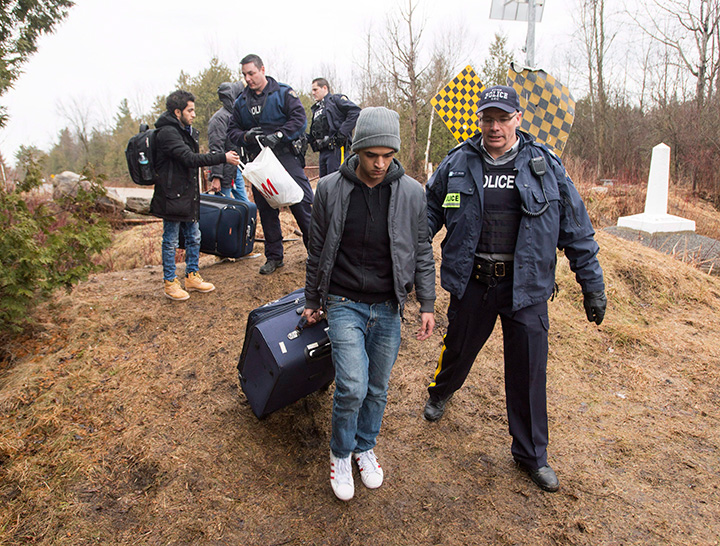The frontier between Canada and the United States is the longest undefended border in the world.

The longest undefended border in the world. It’s a proud declaration of and by great neighbours who could foresee no reason to erect barriers and enforce the separation between their territories.
Recently though, the Canada/U.S. border has become a source of concern in this nation as thousands of migrants and/or refugee applicants cross into Canada from the United States without authorization and by intentionally bypassing official and staffed border crossing stations.
Available personal documentation may or may not be valid, something Canadian officials have no means to instantly determine.
For many of the newly arriving, the only documentation they believe necessary is an ill-advised tweet by Justin Trudeau dated Jan. 28, 2017. “To those fleeing persecution, terror and war, Canadians will welcome you regardless of your faith. Diversity is our strength. #Welcome to Canada.”
That the prime minister of Canada would issue such a blanket invitation on the day after the U.S. President signed an executive order barring refugees and visitors from Iran, Iraq, Libya, Somalia, Sudan, Syria and Yemen was always going to result in unlawful entry to Canada.

Get daily National news
Unlawful to whom, though? So-called “Sanctuary Cities,” where local authorities have determined they will proffer limited support to federal authorities seeking undocumented persons, have begun to dot the Canadian landscape.
Are municipal governments authorized to make such decisions? Are local police empowered to offer less than full cooperation to their provincial or federal counterparts? Watch those questions tie up the courts.
What happened to the Safe Third Country Agreement between Canada and the U.S.? The agreement is intended to counter refugee claimants of convenience. No refugee “country shopping” was the fundamental objective. If a refugee claimant is already present in a nation deemed safe to refugees (the U.S. and Canada qualify), then there should be no option to bypass claiming refugee status in the first such nation of arrival in order to seek out what may appear to be better circumstances in the neighbouring jurisdiction.
The agreement has proven increasingly ineffective because it only applies when a migrant or refugee claimant attempts to cross the border at an official crossing staffed by both nations.
Make your way into Quebec from New York State on the much reported unofficial border at Roxham Road, and Canada will take you in, begin to process your refugee application and make you instantly eligible to participate in our national healthcare and social programs until such time as your claim is finally adjudicated. That’s a process which may be measured in years, instead of weeks or months.

WATCH ABOVE: RCMP officers could remain at the Roxham Road border crossing in St-Bernard-de-Lacolle, Que.
What the actual numbers of unauthorized border crossings from the U.S. to Canada are, we don’t know. No regularly updated numbers are available. We do know Quebec complained about numbers of migrants entering the province (which has an immigration system separate to that of the rest of the nation) and Ottawa announced federal officials would begin to ask refugee applicants if they preferred Ontario over Quebec. When that is the case, applicants would be taken to Toronto, where Mayor John Tory immediately complained of a lack of funds to properly care for large numbers of newcomers.
It will sound harsh to some, but the door to Canada should be closed because we cannot absorb, nor should Canadians be expected to absorb, a growing and uncontrolled number of arrivals from the U.S. who view this country as an improvement over what is available to migrant/refugee claimants in the U.S.
To permit unchecked entry to Canada is also unfair to the many thousands of immigrant applicants waiting patiently for official permission to come in an organized and manageable manner.
Roy Green is the host of the Roy Green Show on the Global News Radio network.








Comments
Want to discuss? Please read our Commenting Policy first.